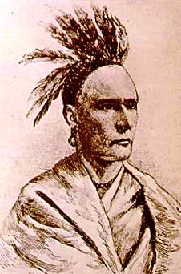 |
Iroquois Leader
![]()
Note: The Iroquois leader pictured above is Tachnechdorus, more commonly known as Logan. In many ways his life was typical of Iroquois leaders living during the mid-to late 1700s. To learn more about Logan, follow this link.
![]()
At the time of our study, each Iroquois tribe was an autonomous unit, which participated in the larger confederacy. The tribe consisted of different clans, which were made up of even smaller family units. The sense of community was important in Iroquois society. Although there was a strong leadership structure, there were no police, or formal legal system, as we know it. When someone did something that threatened the tribe, he or she was expected to show appropriate remorse or run the risk of being ostracized from the tribe.
Iroquois leaders did not horde material goods. In Iroquois society, no one would starve unless the whole tribe was starving. There was also little social stratification within the tribes. Although each tribe had leaders, they did not have control over the population but acted instead in accordance with the wishes of the tribe.
Men were the primary voices in leadership, but the women were the power behind them. Senior women of the tribe selected men to participate in Council sessions, which were the primary means of addressing community concerns. Men did not stray too far from the wishes of the women because they needed their support to remain in power.
In 1747, Cadwallader Colden, the Lieutenant Governor of the New York colony, wrote the first accounts of the Iroquois constitution and political system. Colden was considered a scholar of British colonial affairs. Through his political and scholarly work he became very close to the Iroquois people. Colden's experiences with the Iroquois are documented in his "History of the five Indian Nations Depending on the Province of New York in America." Follow this link to read a letter from William Johnson to Mr. Colden on the subject of the Iroquois. Here is a sample from Colden's book.
![]()
|
"Each nation is an absolute republic by itself, governed in all public affairs of war and peace by the Sachems of old men whose authority and power is gained by, and consists wholly in, the opinions of the rest of the Nation in their wisdom and integrity. They never execute their resolutions by compulsion or force upon any of their people. Honor and esteem are their principle rewards as shame and being despised are their punishments." The Iroquois military leaders, like the civilian leaders obtained their authority by "…the general opinion of their courage and conduct, and lose it by a failure in those ventures…" |
![]()
Iroquois leaders were regarded as servants of the people and in order to maintain the people's respect, they were expected to "give away" the plunders of war or the presents of treaty. Typically, tribal leaders were the poorest members of the tribe.
Not only material goods were equally distributed among tribal members. It was the opinion of Benjamin Franklin that amongst the Iroquois, "Happiness is more generally and equally diffused …than in our civilized societies."
Franklin was also impressed by the differences between the Iroquois councils and the British Parliament. The Iroquois leaders were great public speakers, but they were patient listeners as well. Unlike their Colonial counterparts, they did not interrupt each other during political discussion. Though they might not have necessarily agreed with a particular point of view, they always listened respectfully until a speaker was done with their presentation.
 We
have already met some of the great Iroquois leaders of the period surrounding
the Albany Congress. If you are interested in meeting one more follow this
link to the story of King
Hendrick's trip to England.
We
have already met some of the great Iroquois leaders of the period surrounding
the Albany Congress. If you are interested in meeting one more follow this
link to the story of King
Hendrick's trip to England.
Learning Aids | Great Law of Peace | US Constitution | Timeline | Works Cited
© 1 October 2001, Portland State University